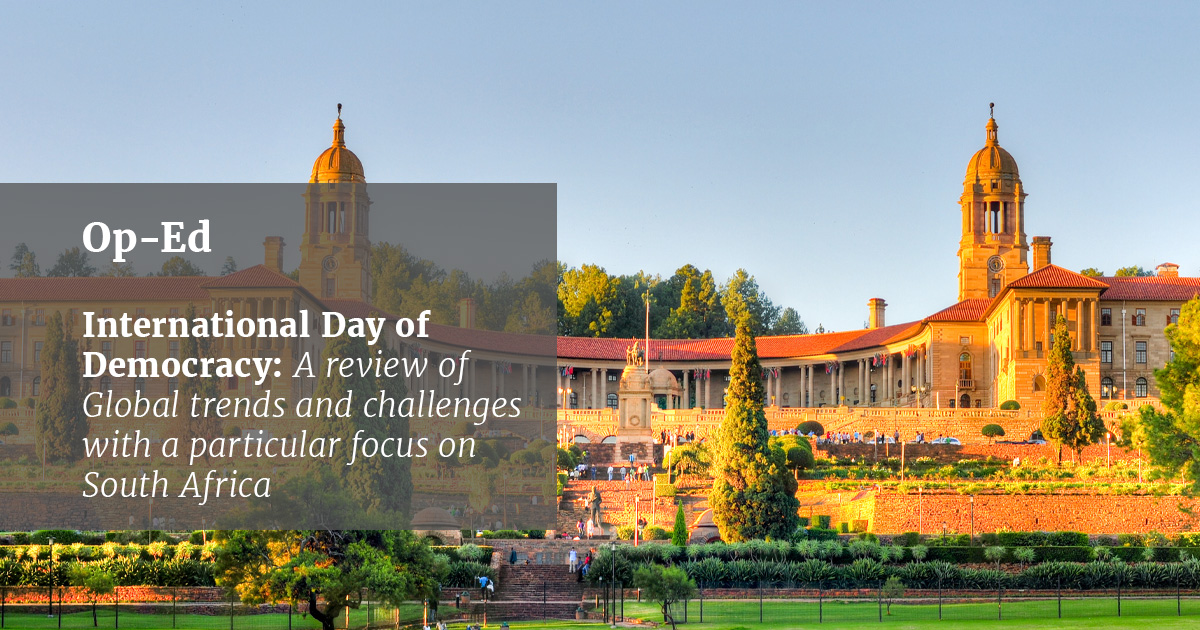by Tendai Mbanje
On 15 September, every year, the Inter-Parliamentary Union (IPU) and parliaments worldwide celebrate the International Day of Democracy, declared by the United Nations General Assembly in 2007. In its resolution A/RES/62/7 establishing the International Day of Democracy, the United Nations noted that ‘‘while democracies share common features, there is no single model of democracy’’ and that ‘‘democracy does not belong to any country or region’’. The International Day of Democracy is meant both to celebrate democracy and to serve as a reminder that the need to promote and protect democracy is as urgent now as ever. Interestingly, the choice of 15 September for the International Day of Democracy corresponds to the adoption in September 1997 by the IPU of a Universal Declaration on Democracy. This Declaration affirms the principles of democracy, the elements and exercise of democratic government, and the global scope of democracy.
This year’s theme
This year’s theme for the International Day of Democracy is focused on the importance of Artificial Intelligence as a tool for good governance. In his message for the observance, Secretary-General António Guterres notes that AI has the potential to enhance public participation, equality, security, and human development but warns that if “left unchecked” its dangers “could have serious implications for democracy, peace, and stability”. Reflecting on this year’s celebration, the Secretary-General has reiterated that the International Day of Democracy is an opportunity to reinforce the importance of upholding free speech, civil liberties, and the rule of law; ensuring accountable institutions; and protecting and promoting human rights.
This year, major elections are happening across the world. In Africa, about 19 elections are expected to take place throughout the year. Many democracies are being tested, with conversations about AI at the centre of these elections. In Southern Africa, the Republics of Botswana, Namibia, and Mozambique are democracies that must pass this test. South Africa has recently passed its test by holding elections praised worldwide. Interestingly with few challenges posed by AI. While other democracies are winning, many democracies across the world are shrinking, and human rights violations are worse than before with lives being lost in Sudan, Russia, and Ukraine as well as in Israel and Palestine to mention a few. AI has also been at the centre of these conflicts, used for precision attacks to mention a few. The tensions are rising geopolitically with many nations preparing for war than ever in history. Given these challenges, hope for a democratic world is diminishing.
Despite, the dwindling hope, International Day of Democracy continues to remind us of and provides an opportunity to review the state of democracy in the world and Africa with a particular focus on technology and AI. Democracy remains our goal, and only with the full participation of and support by the international community, national governing bodies, civil society, and individuals, can the ideal of democracy be made into a reality to be enjoyed by everyone, everywhere. At the heart of this day, 15 September is a reminder that democracy is about freedoms such as freedom of expression, which is a fundamental human right, enshrined in Article 19 of the Universal Declaration of Human Rights. But around the world, there are governments and those wielding power who find many ways to obstruct it and crash it. Many governments in Africa remain guilty of such violations. Article 19 of the Universal Declaration of Human Rights states, “Everyone has the right to freedom of opinion and expression; this right includes freedom to hold opinions without interference and to seek, receive and impart information and ideas through any media and regardless of frontiers.” The link between democracy and press freedom is also enshrined in the International Covenant on Civil and Political Rights.
In South Africa, International Democracy Day holds particular significance due to the country’s historical struggle against apartheid and its transition to a democratic state. Celebrating this day serves to reflect on the progress made and challenges presented. It is a time for South Africans to reflect on the progress made since the end of apartheid and the establishment of a democratic government. It is also time to remind citizens to remain vigilant about the protection of their rights and the strengthening of democratic institutions.
Despite the bleak situations arising from wars and conflicts globally, there is always hope. History shows that societies often demonstrate resilience and find ways to rebuild and reconcile. It is time to intensify our efforts in using technology and AI to build democracies again. It is also time to support numerous global efforts aimed at supporting democratic elections, governance, conflict resolution, peacekeeping, and democratic development. Grassroots movements and civil society organizations should be supported to ensure they remain active and a beacon of hope. Ultimately, International Democracy Day serves as a reminder for all of us that while technology and AI are a challenge and a blessing, the pursuit of democracy, peace, and human rights is an ongoing journey worth undertaking, we have no choice but to fight until our last breath. We must harness the positive impact of AI to ensure human rights thrive.


